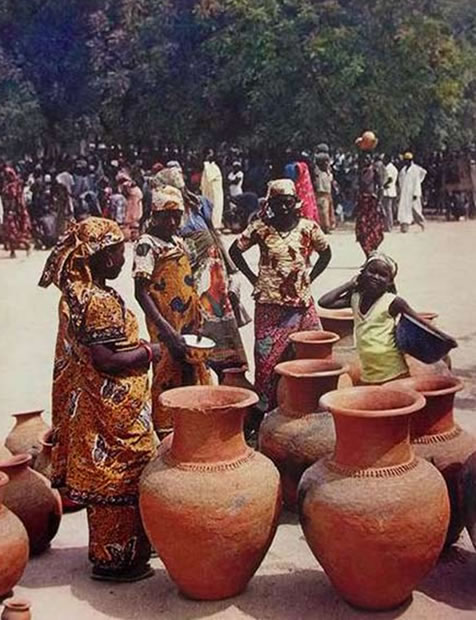Apr. 2008: “The water pot presses upon the small circular pad.” – Acholi (Uganda) Proverb
Agulu pii odiyo otac. (Acholi)
Jungu la maji hukandamiza kata. (Swahili)
The water pot presses upon the small circular pad. (English)

Acholi (Uganda) Proverb
Background, Explanation, Meaning and Everyday Use
 The Acholi people live mainly in Northern Uganda. The otac is the small circular pad used as a stand and also for carrying water pots on the head. Unless the pot is lifted the pad cannot be removed. The Acholi proverb refers to the position of an individual who is forced by authority or public opinion to do or to refrain from doing certain acts against his or her will. The proverb presupposes the wisdom of a practical existential option for an action that promotes the good of the community.
The Acholi people live mainly in Northern Uganda. The otac is the small circular pad used as a stand and also for carrying water pots on the head. Unless the pot is lifted the pad cannot be removed. The Acholi proverb refers to the position of an individual who is forced by authority or public opinion to do or to refrain from doing certain acts against his or her will. The proverb presupposes the wisdom of a practical existential option for an action that promotes the good of the community.
Biblical Parallels
“So Pilate, wishing to satisfy the crowd, released Barabbas for them; and after flogging Jesus, he handed him over to be crucified” (Mark 15:15).
“Could anyone refuse the water of baptism to these people, now they have received the Holy Spirit just as we have?” (Acts 10:47). In the context of this Scripture passage Peter (as well as the other Jews present) were surprised that the Holy Spirit had come down on the Gentile believers as well. They were to recognize their Gentile colleagues as their brothers and sisters in Christ. Thus the Gentiles were admitted to Baptism even though the Jewish tradition would not have allowed this.
NOTE: Today tribalism and ethnicity are one of the main causes of oppression, violence and wars in Africa. As Christians the foundation of our identity is first and foremost in Christ through Baptism. All other elements of our identity come after that.
 Contemporary Use and Religious Application
Contemporary Use and Religious Application
This Acholi proverb can be applied to the call for reconciliation and peace in Kenya against the background of the violence that immediately followed the December, 2007 General Election. The voice of the suffering Kenyan people is like the agulu pii pressing on the optic — the political leaders who are expected to come up with practical solutions to bring about reconciliation and peace among the people even if the wishes of the individual political leaders may not be realized.
This also reinforces the theme of the just completed 2008 Kenya Lenten Campaign: “With a New Heart and New Spirit” (Ezekiel 36:26). Unless we accept the Risen Lord to renew us, the much desired call for reconciliation and peace may not bear fruit in our lives.
Rev. Thomas Komakech, AJ.
General Council – Apostles of Jesus
P.O. Box 24946, Karen,
00502 Nairobi, Kenya
Email: frthomask@yahoo.com
